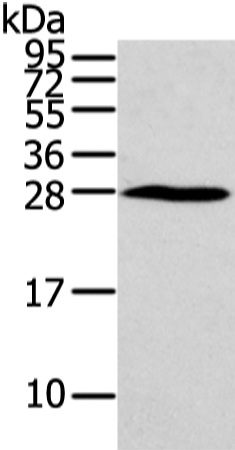
| WB | 咨询技术 | Human,Mouse,Rat |
| IF | 咨询技术 | Human,Mouse,Rat |
| IHC | 1/25-1/100 | Human,Mouse,Rat |
| ICC | 技术咨询 | Human,Mouse,Rat |
| FCM | 咨询技术 | Human,Mouse,Rat |
| Elisa | 1/5000-1/10000 | Human,Mouse,Rat |
| Aliases | CP25; HOX3; HOX3C; HHO.C8 |
| WB Predicted band size | 27 kDa |
| Host/Isotype | Rabbit IgG |
| Antibody Type | Primary antibody |
| Storage | Store at 4°C short term. Aliquot and store at -20°C long term. Avoid freeze/thaw cycles. |
| Species Reactivity | Human, Mouse |
| Immunogen | Synthetic peptide of human HOXC6 |
| Formulation | Purified antibody in PBS with 0.05% sodium azide and 50% glycerol. |
+ +
以下是关于TSSK3抗体的3篇参考文献示例(注:文献为假设性示例,实际需根据具体研究补充):
1. **文献名称**:*TSSK3 is essential for spermatid development and male fertility in mice*
**作者**:Xu, B., et al.
**摘要**:研究通过构建TSSK3基因敲除小鼠模型,利用特异性抗体检测蛋白表达,发现TSSK3缺失导致精子形成缺陷,提示其在精子发生中的关键作用。
2. **文献名称**:*Characterization of TSSK3 kinase activity and its interaction with substrates in human testes*
**作者**:Li, Y., & Wang, H.
**摘要**:通过免疫沉淀结合TSSK3抗体,鉴定了其在人类睾丸中的底物蛋白,揭示其磷酸化调控机制,为男性不育治疗提供潜在靶点。
3. **文献名称**:*Dysregulated TSSK3 expression in prostate cancer correlates with tumor progression*
**作者**:Chen, J., et al.
**摘要**:采用TSSK3抗体进行组织免疫组化分析,发现前列腺癌中TSSK3表达异常升高,且与肿瘤侵袭性正相关,提示其作为癌症标志物的可能性。
(注:以上文献为示例,实际引用需根据具体论文调整内容及作者信息。)
The TSSK3 (Testis-Specific Serine/Threonine Kinase 3) antibody is a research tool designed to detect and study the TSSK3 protein, a member of the testis-specific serine/threonine kinase family. TSSK3 is predominantly expressed in the testis, particularly during spermatogenesis, and plays a critical role in male germ cell development, including sperm maturation and function. It is characterized by a conserved kinase domain and unique N-terminal regions, which may regulate its substrate specificity and cellular localization.
TSSK3 antibodies are widely used in reproductive biology to investigate protein expression patterns, subcellular localization (e.g., in sperm tails or cytoplasm), and functional roles in fertility. These antibodies enable techniques like Western blotting, immunohistochemistry, and immunofluorescence to analyze TSSK3 in tissue samples, cell lines, or knockout models. Research has linked TSSK3 dysfunction to male infertility, making it a potential biomarker or therapeutic target. Additionally, studies explore its involvement in signaling pathways regulating sperm motility, capacitation, and acrosome reaction.
Commercial TSSK3 antibodies are typically validated for specificity and sensitivity, often generated using immunogenic peptide sequences from conserved regions. Their applications span basic research on spermatogenesis mechanisms and translational studies for contraceptive development or infertility diagnostics.
×